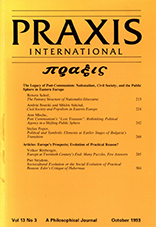Post-Communism's "Lost Treasure": Subjectivity and Gender in a Shifting Public Sphere
Post-Communism's "Lost Treasure": Subjectivity and Gender in a Shifting Public Sphere
Author(s): Ann MischeSubject(s): Gender Studies
Published by: Blackwell Publishing Ltd
Summary/Abstract: Amidst the excitement generated by the twin projects of democratization and liberalization in post-communist societies, how do we account for the disappearance of these groups from organized politics, just at the time when new spaces for participation are being opened to them? Such phenomena seem to fly in the face of theoretical approaches to the post-communist transitions that focus in too rational a manner on the "reconstitution of civil society" and the inclusionary project of involving widening sectors of the population as actors in cultural, political, and economic life. Almost hidden away in the clamor over the newly pluralistic public sphere is the exclusionary underside of the transitions: the boundaries, both practical and ideological, that are being redrawn by the actors themselves as to who has access to which publics, and with what configurations of discursive and decision-making power. The difficulty in understanding such processes of boundaryformation is compounded by the fact that it often seems to involve selfexclusions, the apparently voluntary retreat of groups of actors from certain domains of public action.
Journal: PRAXIS International
- Issue Year: 13/1993
- Issue No: 3
- Page Range: 242-267
- Page Count: 26
- Language: English

